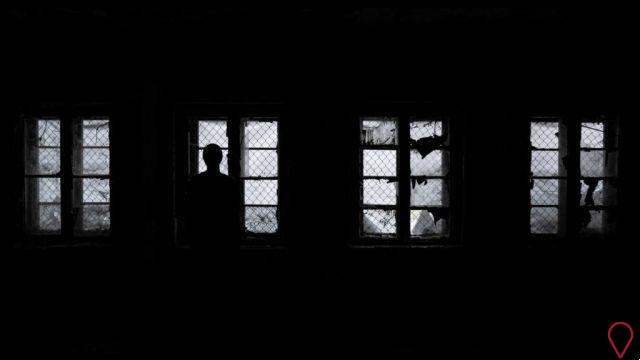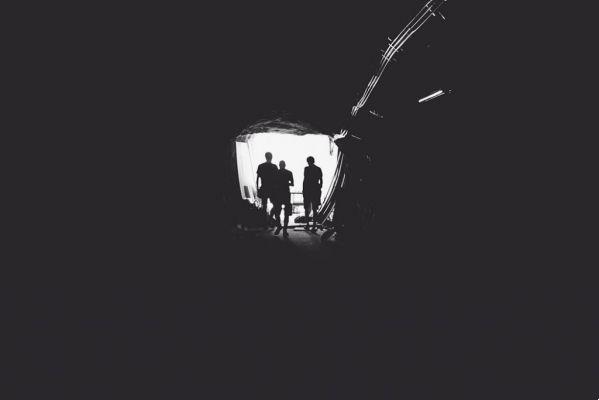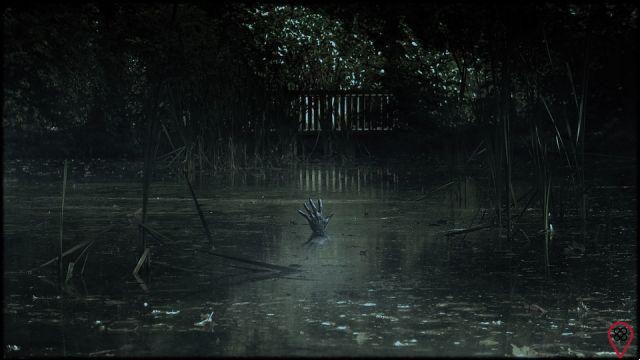Insecurities and fears. Insecurity when speaking in public, with your own body, in making decisions, in entering new situations… Fear of heights, the dark, spiders, closed places…
There are so many things, many that I won't even be able to mention in this article, which bring insecurity and fear to a large part of the world's population.
The idea of this topic came to me for an article, to debate about it, after I saw some opinions about fear that I found a little controversial, but worth reflecting on.
what would be fear e insecurity? Where did they come from? Would they be positive or negative things? How do they affect our lives in general?
First, let's reflect on the concept of fear and insecurity.

Fear would be an affective response to some situation of danger, to feel threatened. Fear or fear about something, justifiable anxiety or not.
Insecurity is the feeling of not being safe and secure. Lack of confidence in yourself, your skills and abilities.
Stop and reflect now. Bring your insecurities and fears into an analytical light. Think about it, could you name me each of them, the origins and triggers?
We can say that insecurity breeds fear. When something takes us out of our comfort zone, something that is unknown, new to us, we become insecure, not knowing how to deal with it, and so fear is generated.
Let's bring the most common insecurities and fears that I mentioned at the beginning of the article, so we can do an analysis and find out why we have so many fears and insecurities.
You may also like
- The attentions you should take with your fears
- Reflect on anxiety, self-control and self-security
- Know what your jealousy says about you
Being the person insecure in making decisions, speaking in public and “entering headlong” into new situations, they do not trust themselves, their own potential, perhaps because of some trauma, or because they were discredited during childhood or adolescence, so growing up into adulthood with this sabotaging belief about himself. This saboteur stays fixed in the unconscious until there is a clearing, and adding an expansion belief to fill that space so that self-sabotaging belief doesn't return. It's the same thing with insecurity with your own body. Since childhood, hearing that you are either thin or fat, the media imposing an aesthetic standard...
And what about fear? Let's talk about fear. Since it is an emotional response to some dangerous situation, it is also related to old traumas. Be conscious, rational or not. Whether in this life or in past lives, traumatic situations that we go through in some incarnation and we take that trauma to other reincarnations.
Yes, a traumatic situation that we had in some past life, we will carry it to future reincarnations. There is the physical body and the metaphysical (soul, aura, spirit, essence, the “I am”), right?
This physical body carries the metaphysical with various information from other lifetimes and joins with the information of who we are being in this lifetime.

For example, if in a past life you had an accident, it is very likely that you will carry unconscious memories of the event into another life. As well as good times, your habits and knowledge.
There is a well-known case of reincarnation that was even documented by the History Channel, the case of the Pollock twins. On May 5, 1957, 11-year-old Jacqueline and Joanna were living in England, when they had an accident with a carriage with unrestrained horses, thus, the two were run over.
After more than a year, the Pollock twins' parents again had daughters, Gillian and Jennifer, born October 4, 1958. When they started talking, the parents noticed some curious things about the girls. They mentioned the accident that happened to their deceased sisters, in great detail (their parents had never talked about it), as well as aspects of the house, the population. Same habits as Jacqueline and Joanna (Gillian recalled memories of Joanna's life, while Jennifer recalled Jacqueline).
The most intriguing thing in this case was the fact that the two were afraid of cars, this was visible by their reactions to passing cars on the street.
This case is incredible, isn't it? They had an aversion to cars because of an accident. Notice the level of awareness they had to the point of talking about what happened in the smallest details, even the sensations it caused.
Anyway, it's up to you to believe it or not, respect remains the same.

Returning to the subject of fears and insecurities, there are cases where the origin is genetic.
Fear and insecurity alter the chemical reactions of the brain, high load of adrenaline, noradrenaline and cortisol. It not only alters the brain chemistry, but also the DNA itself.
This was discovered in research done by Emory University in Atlanta, effects of fear, using rats as guinea pigs. They exposed small rodents to the cherry blossom scent, associating the smell with electric shocks. After these animals reproduced, two generations of these mice reproduced the fear of that smell.
In other words, fear can not only be transmitted to children in a behavioral way, mirroring itself in behavior or because certain beliefs of fear and insecurity have been instilled in the mind; but also by genetics, DNA.
The energy of love is very powerful, but the energy of fear is also very powerful.
But why do we feel so afraid and have so many insecurities? Why can't we get rid of it?
Some spiritualists, psychoanalysts and body language experts say that fear is an antonym of love, because it is possible for you to love the person and be angry with them (not at the same time, of course); but when there is the aversion and contempt that fear brings, then you conclude, from body language, that love is over.
They say that love moves things much more fluidly and let's combine, when we do it with love, it's much better and it seems that things naturally flow, things are aligned, harmonized.
When we deal with the subject of “fear”, there is a long debate. I've always heard that fear would be a good thing to warn us about danger, even some people tell me that fear is paralyzing, that it prevents us from taking a step forward.
That last statement made me rethink my concept of fear.
Let's assess what our reactions are when we are afraid. Paralysis, wheezing, feeling of helplessness, stress and anxiety. It makes sense to say it's the opposite of love.

Although it is a negative feeling, it is quite different from feeling angry. Not that it's a nice thing to feel, but sometimes, like I said, it's anger that gives you the impetus to move. When done well, of course. As I said in a previous article, there are times when if you don't show and express your anger, things remain the same, we will remain in the same situation. Sometimes the universe asks for a little bit of our anger, so that we can get rid of certain situations and to wake up and take some action. Furthermore, the feeling of anger has to do with our most primal instinct, that of self-preservation. Yes, there are three primordial elements existing in the human being (whether you are aware of it or not): food, survival and reproduction of the species. But what about fear? It is not part of any of these primitive human instincts, the survival instinct only tells us two things: fight or flee in difficult situations, but fear paralyzes us, does not allow us to move forward in life, we are in shock in situations of fear. .
"But Anne, it's fear that makes us not do stupid things that risk our lives."
It is not fear that prevents us, for example: from jumping off a cliff, entering a bear or lion's cage, from putting our hand in fire... But common sense.
Common sense is to rationalize the consequences of our actions, is to know that if we take such an attitude, the result would not be good. It's our preservation instinct.
“What if we are chased by wild animals and the only way to save us is to jump off a canyon?”
That would be unlikely, unless you're some sort of Richard Rasmussen or Bear Grylls of life, who are always in extreme places, dealing with wild animals.
Even if that's the case for you, it's still common sense that makes you think "Either I jump off the canyon or I'm attacked by wild animals". It is not fear, because fear, being the opposite of love, is the opposite of respect. For respect is the beginning of love and if you are afraid of something or someone, you do not love that particular thing or person.

“But Anne, we all have fears, even you have fears… Now what? What to do?"
We have to reflect on how fears have disrupted our lives, without judgment or pressure. He knows? I see a lot of people in this area of personal development and spirituality talking in an extremist way about fear. I know that we shouldn't vibrate in fear, fear is something negative and it's cool for these coaches to open the eyes of their coachees to wake up and free themselves from fear, but I see them in a charge, pressure, seeming to curse, saying that the life of this person is in the hole, in the mud because of fear. He pushes his student even further into this process of insecurities and fears, creating new fears and insecurities in them, of doing badly in life, of being incapable and impotent.
This coach gives a ready answer, does the service in a way that creates a dependency on his coachee, following a traditionalist way of teaching of being the only holder of knowledge, his students being mere receivers of this knowledge.
Not wanting to criticize the traditional way of teaching, I think this system is very valid in some situations, but there are others that do not fit this way of teaching.
I say this as someone who had experience in the classroom as a Portuguese teacher and I saw that the students were graduating, without even knowing the history of the native language of España, they think our language came only from European Portuguese, which is not. There are several languages that influence our language. Years go by and the same way of educating remains and that is why many students are unable to carry out what the teacher passes on to them in terms of content.
There has to be an incentive for autonomy when teaching and when talking about personal issues such as fears and insecurities, it is even more necessary.
Show the way, but let the person take the steps, so that he learns and apprehends what has been taught.
Do you have any fears or insecurities? Because we all do, I myself have my fears and insecurities that I still have to deal with, after all I'm not made of steel.

To work this out in us, we have to walk a path on our own two feet. See where that fear, insecurity came from, what the triggers were, re-signify it. There are no ready-made answers, nor can I give you that or walk this path for you.
Facing fears and insecurities requires self-knowledge, which is something continuous, we are getting to know each other more and more every day, we all have to walk this path with our legs, because no one can walk this path for you and don't even expect ready answers or that just agree with you.
I have already been contacted by some people who asked for advice and help regarding their fears and insecurities and unfortunately I did not answer them for these three reasons: these people told me “Ah, but it is difficult”, “Ah, but my case is different” and I I realized that they just wanted me to answer what they wanted to hear, for me to agree with them and say: “It's really, it's difficult, your case is unique, impossible to solve. Wow, how complicated” and give a magic formula, a ready answer.
I can not do this. First, I cannot impose my way of thinking on anyone, nor can I interfere in someone's evolution. As I said, there are people who need time to evolve, or they don't even evolve and that's okay. Let's learn to live with different opinions.
I'm not Cinderella's fairy godmother, who with a magic wand, the princess is already very ready, fine and full for the party, although the fairy could only help her up to that point, the rest would depend on her.
It's the same when we are children. In childhood, our brain is like a blank notebook that is filled over time with our internal and external experiences, right? The people who take care of us take us by the hand at the beginning of our lives to teach us the basics (Ex: walking, talking and writing), as we do not develop this knowledge in the early stages of life, so we need someone for practically everything , but when we reach a certain age, this dependence no longer fits, we create or should have this autonomy.
PS: autonomy (independence) is different from self-sufficiency (I don't need anyone, I'm an "island" - WAIT FOR NEXT ARTICLES!)

























